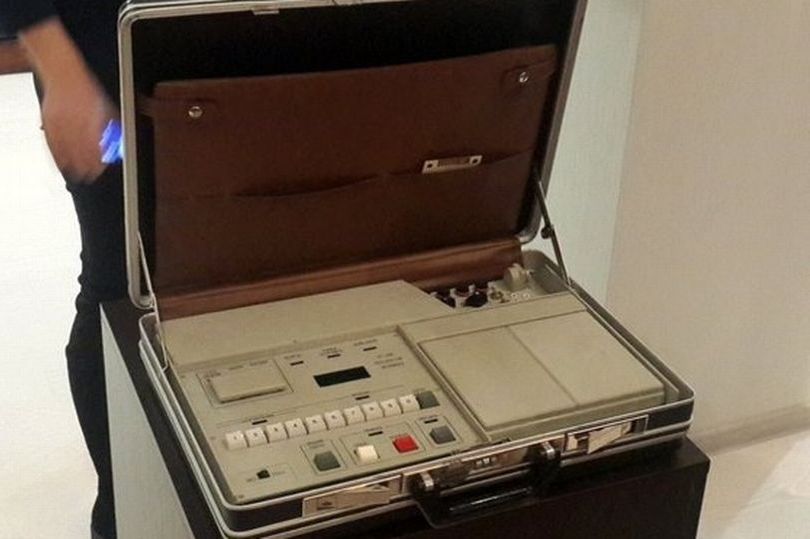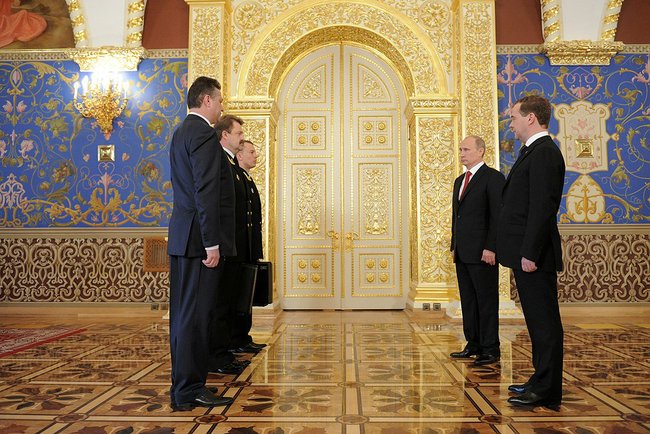
What do Putin’s constitutional changes mean for Russian nuclear launch authority?
For years, Russia analysts have speculated about the future of Russian political leadership after 2024, when Vladimir Putin will be constitutionally mandated to vacate the Presidency.
During Putin’s annual State of the Nation address, we finally got our first taste of what to expect.
Instead of today’s highly-centralized Presidency, under the proposed changes the power of the Presidency will be somewhat reduced, while the power of the Prime Minister, as well as both the Duma and the Federation Council (the lower and upper houses of parliament) will be increased––thus ensuring a system of several relatively balanced government entities, none of which are theoretically strong enough to overpower the others. Putin will likely remain at the top of the pyramid in a new “father-of-the-nation” type of role (possibly as the head of the newly-empowered State Council, or perhaps in another role entirely). This new system would allow him to retain power after 2024, and would signal the most dramatic shift in Russian constitutional authority since the document was adopted in 1993.
This shift in power, however, poses a series of complications for Russia’s system of nuclear launch authority.
Under Article 87.1 of the Russian Constitution, the President is the Supreme Commander-in-Chief of the Armed Forces, and the Law On Defence states that the Supreme Commander-in-Chief is the ultimate authority on all nuclear-related matter. Additionally, the current Russian military doctrine states that “The decision to use nuclear weapons shall be taken by the President of the Russian Federation.” To that end, the President possesses a Cheget briefcase, which allows the President to monitor strategic crises and transmit nuclear command decisions through the Kazbek command and control network, using the Kavkaz special communications system.
Acting President Putin with the Cheget nuclear briefcase (kremlin.ru, 1999).
In addition to the President, it is widely believed that both the Defense Minister and the Chief of the General Staff also possess Cheget briefcases, although ultimate launch authority rests with the President. Given the tremendous secrecy surrounding Russian nuclear launch authority, these extra briefcases pose a bit of a mystery. It is possible that the additional two briefcases might act as a form of validation or check against the President’s nuclear launch decision (this is implied in Valery E. Yarynich’s C3: Nuclear Command, Control, Cooperation, in which he states that these three individuals “together prepare the authorization for the use of nuclear weapons”); however, given that neither the Defense Minister nor the Chief of the General Staff are constitutionally or doctrinally designated as nuclear decision-makers, it seems more likely that their briefcases would function as (potentially necessary) links in the chain of command, which would be used to transmit the President’s nuclear launch order down to the relevant launch and warhead custodial units.
Interestingly, the Prime Minister appears to have no nuclear decision-making authority and does not possess a Cheget briefcase. This is odd, considering the fact that under the Constitution, if the President is incapacitated then the Prime Minister assumes all presidential duties––which would presumably include the authority to launch nuclear weapons. The apparent absence of the Prime Minister in the nuclear chain of command prompts a question highlighted by Jeffrey Lewis and Bruno Tertrais in their recent overview of nuclear launch authority: “When Dmitry Medvedev held the presidency during 2008–12, and Vladimir Putin was prime minister, was Medvedev authorized to use nuclear weapons without Putin’s approval?”
We don’t know the answer to this question, but it has significant implications for Putin’s proposed constitutional changes. If Putin was comfortable being formally left out of the nuclear chain of command for those four years, he might be similarly comfortable being kept out of the loop after he vacates the Presidency. If so, then the current nuclear command system could be maintained even after the Constitution is revised, and Putin would have to trust that his Presidential successor would informally follow his direction on nuclear policy.
The Cheget nuclear briefcase transfer from Medvedev to Putin during his 2012 presidential inauguration (kremlin.ru, 2012)
However, it is also possible––although perhaps unlikely, depending on your assessment of Putin’s intentions––that ultimate nuclear launch authority will follow Putin wherever he goes. This would mean that if the proposed constitutional changes are adopted, the chain of command and their associated laws would also need to be revised in order to reflect Putin’s new position.
According to the bill submitted to the Russian parliament, the proposed changes will constitutionally empower the State Council to determine “the main directions of home and foreign policy.” Absent more details, it is unclear whether this would include nuclear launch authority. However, if Putin becomes the head of the State Council, as some analysts are predicting, it is possible that the military doctrine would be revised to empower him––and not the President––as the ultimate nuclear decision-maker. If so, the President’s Cheget would either be transferred to Putin’s new position, or else Russia would need to deploy a fourth briefcase.
This would be an interesting development, as Putin additionally noted in his speech that the President should still be in charge of the Russian military. If the President did remain Commander-in-Chief, but control of nuclear weapons transferred from the Presidency to Putin’s new position, this would mark a new precedent in nuclear policy: the first time that the Commander-in-Chief of a nuclear-armed state was not also the ultimate nuclear decision-maker (the one exception to this rule is the United Kingdom, where the Queen is technically the Commander-in-Chief; however, both the armed forces and Trident nuclear submarines are de facto commanded by the Prime Minister).
The situation in Russia is shifting quite rapidly, and absent more details about how Putin intends to define the balance of power after 2024, one can only speculate as to how nuclear launch authority will develop under these new constitutional changes. But unless Putin decides to declare himself “President-for-Life” à la Xi Jinping, he will have no choice but to redesign Russia’s nuclear launch authority if he intends to keep his finger on the nuclear button.
This publication was made possible by generous contributions from the Carnegie Corporation of New York, the John D. and Catherine T. MacArthur Foundation, the New Land Foundation, the Ploughshares Fund, and the Prospect Hill Foundation. The statements made and views expressed are solely the responsibility of the authors.
The last remaining agreement limiting U.S. and Russian nuclear weapons has now expired. For the first time since 1972, there is no treaty-bound cap on strategic nuclear weapons.
The Pentagon’s new report provides additional context and useful perspectives on events in China that took place over the past year.
Successful NC3 modernization must do more than update hardware and software: it must integrate emerging technologies in ways that enhance resilience, ensure meaningful human control, and preserve strategic stability.
The FY2026 National Defense Authorization Act (NDAA) paints a picture of a Congress that is working to both protect and accelerate nuclear modernization programs while simultaneously lacking trust in the Pentagon and the Department of Energy to execute them.

